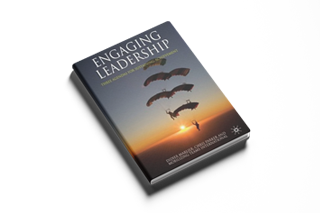Think back to leadership in the prehistorical tribes, then in the various first great civilizations, Sumerians, Egyptians, Sabaeans, Harappans, Chinese, Indians, Olmecs, Caralians, followed by the Romans, the Middle Age, the Renaissance, the industrial revolution or now, Toffler’s announced third wave… Did the paradigms on which leaders based their “license to operate” widely differ? In all those Worlds anchored into linear, predictable and organized contexts, leadership was pretty much comparable until the end of the 20th century.
Then came the era of “Disruption Economy”. I was amongst the many who believed it would be triggered by technology. It certainly was, for a part, but I was far to think a virus would expose us all to understand what Disruption could be… And today, in an unpredictable, chaotic, complex and non linear World, leadership, after centuries of immobilism, is called to a profound change!
We are just beginning our reflection/study on what “Disruptive Leadership” will be about. But, so far, we see 7 themes emerge:
- The dusk of “Content Leadership” and dawn of “Context Leadership”: This is a fundamental belief (“the leader should know!”), mindset (I can’t be a good leader if I don’t tell my people how to master the situation) and behavioural shift (I need to progress by asking questions rather than by providing answers).
- The disappearance of the “fear leader” and emergence of Psychological Safety (self-disclosure + feedback = trust=>Psychological Safety): In 1998, one of the World’s most capped football coaches, in charge of the World’s best team, lost the final of “the Cup” against a booed “loser” (at least, he was was prior to becoming a hero for winning it!) whose mantra was about killing the fear and create the conditions for his players to do and be their best. Nevertheless, how many leaders still believe that “Stress is good” (proven completely wrong by Mihaly Csikszentmihalyi, the ”guru” of motivation) and that a “High Challenge/Low Support” culture is what brings results. Google’s “Aristoteles Project” has demonstrated that Psychological Safety is what brings positive results!
- Identify and challenge orthodoxies: The Disruption Economy welcomes those who think beyond the actual limitations. It encourages us to identify self-imposed limits and unconscious beliefs we follow and decisions we took. Back in a 1997 interview, Strategy Professor, Gary Hamel was already inviting us to “to systematically deconstruct the orthodoxies and dogmas that rule a business”.
- Migrate from Critical Thinking tools to Self-Critical Thinking philosophy: I recently came across a LinkedIn sponsored “Critical Thinking Course”. What a bore! It was (with all due respect!) a “Critical Thinking Course for Engineers”, a tool box stolen to TQM (Total Quality Management), Kepner Tregoe’s once celebrated Problem-Solving logics and Process Re-engineering, aiming at a better quality decision making. So let’s depart from that limited toolbox and rebrand what we mean in “Self-Critical Thinking”. Political leaders, negotiators, business heads need to learn the skills of observing how they act and react in a conversation, seek to understand why the other party say and think what they say and think, be convinced that their value added is not into winning the argument and having it their way but rather behave like a partner to a wider cause and a problem-solver rather than a lawyer.
- Understand the importance of Ethos and Pathos: back in 2009, our book, “Engaging Leadership” largely discussed the importance of Aristoteles’ Logos (rationale and competences), Ethos (values and behaviours) and Pathos (passion and emotions). In 2020/2021, in times of isolation, doubt and confinement we have witnessed that leaders who create Psychological Safety, Informality and Trust, who display Vulnerability, those who reduce the Power Distance and balance well transactional and relational ways to connect have created far more value than their 20th Century counterparts.
- The emergence of Community Engagement, not just Team Leadership: Teams are to what the army is to organizational models, Community is a blend between commando and self-organized entities. Teams are pyramidal, hierarchical and siloed organisations. Communities are flatter, connected, volunteers spirited boundary free organisms. Samba schools partially are Communities, at least they are based on that idea. See what two of samba’s great Ademir da Silva (composer) and Carlão (master Carlos Sebastian who died from Covid a year ago) say about what it feels to work for a Community.
ADEMIR
CARLÃO
- Trust will be given prior to be earned: It has been a lengthy debate and both sides were presenting convincing arguments. But something has changed with the disruption wave: It is a powerful (and, at times, lethal, accelerator). Earning trust takes time and creates an atmosphere of defiance. As Business Futurist, Gerd Leonhard says, “Trust is the new currency” in the Disruption Economy. Putting ourselves in danger, taking risks, because we trust others (and we will trust them better when reducing Power-Distance, practising a relational and informal way to connect etc.) will be winning edges.
These are the first strong trends we see emerge in “Disruptive Leadership”. We believe they will fundamentally challenge what leadership is and how it will impact our businesses. This week, Nick and I will have the chance to proceed with our first interview for our YouTube Channel. Please subscribe, not for our egos as one person cutely thought, but because the higher the number of subscribers the more diverse and interesting will be our “Disruptive Speakers”… www.youtube.com/channel/UCKaZtw7UPUGD82ejWofN1mg.



“Trust will be given prior to be earned”… sounds very biblical but it is so powerful, it should be tattooed on every Leaders arms 🙂
Thanks
Thank you, dear Stéphane… I laughed at the “Biblical” reference… Thank you. And, indeed, it increasingly seems that Trust should be given, increasingly, in a World where speed is critical. And,sometimes (as I keep on learning for myself 😉 it may create disasters. But would waiting to be 100% sure, have been a better option? I am not sure.